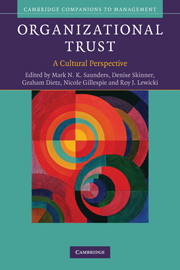Book contents
- Frontmatter
- Contents
- List of figures
- List of tables
- Note on editors
- Note on contributors
- Foreword
- Editors' acknowledgements
- Part I The conceptual challenge of researching trust across different ‘cultural spheres’
- Part II Trust across different ‘cultural spheres’: inter-organizational studies
- 5 Examining the relationship between trust and culture in the consultant–client relationship
- 6 Checking, not trusting: trust, distrust and cultural experience in the auditing profession
- 7 Trust barriers in cross-cultural negotiations: a social psychological analysis
- 8 Trust development in German–Ukrainian business relationships: dealing with cultural differences in an uncertain institutional context
- 9 Culture and trust in contractual relationships: a French–Lebanese cooperation
- 10 Evolving institutions of trust: personalized and institutional bases of trust in Nigerian and Ghanaian food trading
- Part III Trust across different ‘cultural spheres’: intra-organizational studies
- Part IV Conclusions and ways forward
- Index
- References
9 - Culture and trust in contractual relationships: a French–Lebanese cooperation
Published online by Cambridge University Press: 05 June 2012
- Frontmatter
- Contents
- List of figures
- List of tables
- Note on editors
- Note on contributors
- Foreword
- Editors' acknowledgements
- Part I The conceptual challenge of researching trust across different ‘cultural spheres’
- Part II Trust across different ‘cultural spheres’: inter-organizational studies
- 5 Examining the relationship between trust and culture in the consultant–client relationship
- 6 Checking, not trusting: trust, distrust and cultural experience in the auditing profession
- 7 Trust barriers in cross-cultural negotiations: a social psychological analysis
- 8 Trust development in German–Ukrainian business relationships: dealing with cultural differences in an uncertain institutional context
- 9 Culture and trust in contractual relationships: a French–Lebanese cooperation
- 10 Evolving institutions of trust: personalized and institutional bases of trust in Nigerian and Ghanaian food trading
- Part III Trust across different ‘cultural spheres’: intra-organizational studies
- Part IV Conclusions and ways forward
- Index
- References
Summary
Summary
This chapter explores how national cultural differences between partners involved in a contractual relationship may interfere with the development of trust. This is illustrated through a case study of a management contract signed by a French private company (Promostate) and public Lebanese company (SONAT). Using an ethnographic approach and drawing on a qualitative analysis of field interviews, the author argues that the challenges faced by the French and Lebanese parties in developing a trusting relationship are due to classic issues of personal conflicts, differing organizational cultures and power asymmetries. Because their national cultural backgrounds were different, the parties had different conceptions of what ‘good cooperation’ should be that shaped their expectations of trustworthy behaviour and hindered the process of resolving the difficulties they encountered.
Introduction
Contracts are recognized as universal management mechanisms that provide an efficient solution to the problem of coordinating expectations and interactions between economic actors from different nationalities. However, the impossibility of designing complete, explicit and easily enforceable contracts may restrict their effectiveness as a management mechanism (Macaulay, 1963). Trust is supposed to form a viable alternative or complement to contracts. Trust can reduce uncertainty and lead to more efficiently negotiated agreements (Koenig and van Wijk, 1992).
Research on the development of trust in contractual relationships has focused largely on the question of how trust and formal contracts are related. At the same time, culture has been considered a factor in the trust-development process in many ways.
- Type
- Chapter
- Information
- Organizational TrustA Cultural Perspective, pp. 227 - 254Publisher: Cambridge University PressPrint publication year: 2010
References
- 1
- Cited by

